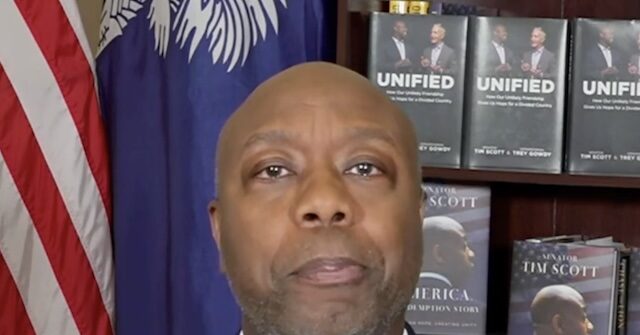On a recent episode of CNN’s “State of the Union,” Senator Tim Scott (R-SC) expressed strong confidence regarding former President Donald Trump’s performance in the upcoming election. In his discussions with voters in key cities such as Detroit, Ohio, and Philadelphia, Scott indicated that he observed significant support for Trump among diverse demographic groups, including Black, Hispanic, and Jewish voters. Scott posited that, despite concerns about Trump’s rhetoric potentially alienating certain voters, he sees a growing momentum favoring the former president that would lead to a successful election day. According to Scott, the closing arguments of the campaign, which center on issues like border security, crime rates, and education, resonate with voters, potentially solidifying Trump’s appeal.
Senator Scott emphasized that voter enthusiasm is notably high for issues that matter to them directly. He highlighted that in Philadelphia, a recent school choice event attracted a varied audience passionate about educational opportunities for their children. This focus on parental choice in education is representative of the broader theme in Scott’s messaging: that Trump and the Republican party are listening to the real concerns of the electorate. He believes that these issues—along with public safety and immigration—are pivotal in winning over voters in the final days before the election, countering narratives that suggest a decline in Trump’s appeal due to his rhetoric.
As Scott detailed the engagement efforts among Black voters and local communities, he underscored the importance of the Republican party’s outreach initiatives. He suggested that the party is making strides in better connecting with various demographic groups by addressing their specific issues. Scott’s assertion indicates a strategic shift within the GOP to create an inclusive narrative that resonates particularly with socially conservative voters who prioritize issues like education freedom and community safety.
Moreover, Scott touched upon a trend where his interactions with voters in various settings have revealed an eagerness for change and an openness to considering Trump’s governance. This interaction supports the notion that late deciders are pivotal in election outcomes and that their concerns about crime and education reform may outweigh traditional party affiliations. The senator’s remarks suggest that many voters are prioritizing policy over party loyalty, especially concerning topics like school choice and public safety, which have emerged as central themes in Trump’s campaign narrative.
Scott’s comments come amid polling that indicates Kamala Harris might be gaining traction as election day approaches. However, his direct experiences with constituents suggest an alternate possibility; he believes Trump’s message on key issues is navigating through to the electorate effectively. This view captures the underlying tension in electoral politics between narrative perception and grassroots voter sentiments. Scott appears to advocate for a broader understanding of voter preferences, emphasizing that the electorate is more complex than prevailing narratives might suggest.
In wrapping up his interview, Scott assured that the focus on substantive issues rather than divisive rhetoric could secure a positive outcome for Trump’s return to prominence. His argument asserts that engagement on the ground will ultimately shape perceptions and decisions for both undecided and committed voters. By focusing on critical areas such as safety, educational opportunities, and broader community concerns, Scott reinforces the idea that Trump’s campaign is resilient and poised for success, highlighting a transformative moment that could redefine voter relations within the Republican party.

